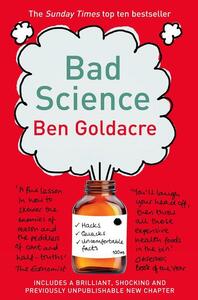Take a photo of a barcode or cover
I wished I could like this book. Don't get me wrong I did like the ideas of the book but I could not stand the ranting of the author and his mockery of not only the readers but everyone in general. Firstly he repeats the same thing in every chapter. Secondly he is all over the place just attacking people and venting his anger everywhere. I feel as if I am reading a one sided arguments in a fight which is packed in terms of a book. Could not take it left the book half way.
Excellent breezy overview
Written in a conversational style, this is a quick-reading overview of what goes into bad science. I highly recommend it for everyone because it offers practical guidance on adding scientific merit, a topic that is almost never taught in school.
Written in a conversational style, this is a quick-reading overview of what goes into bad science. I highly recommend it for everyone because it offers practical guidance on adding scientific merit, a topic that is almost never taught in school.
A very timely and eye-opening book about how wrong we really are about science. From outright quackery (such as a common homeopathic remedy that involves activating water's "memory" by banging it against a horsehair table ten times...what???), to the economic/pedantic reasons that it is so difficult for medical researchers to conduct quality drug experiments, to the statistical illiteracy that creates miscommunication between scientists and journalists, Goldacre covers a breadth of subjects in this groundbreaking book. This book makes me feel simultaneously more frightened about the misinformation that is so prevalent, and more empowered to discern truth from fiction when it comes to analyzing scientific research.
This book is enormously relevant and important right now and is going on my list of books everyone in the world should have to read. It’s also funny.
informative
sad
medium-paced
Excellent book, explains in easy-to-understand language how studies should be interpreted for the layman. These are important topics! The book tackles approach to interpreting research, deciding whether or not a “professional” is telling the truth, vaccines, and digging through alternative remedies using a scientific approach; these are complicated issues, but this book will leave you with a solid baseline understanding of the topics.
informative
medium-paced
I dislike this book so much. When scientists tell people who don't trust/believe in science they're stupid for not believing, it makes them angry (obviously). Anger is the last emotion in the world you want to evoke in someone who disagrees with you. It creates even more division. I hate this book for that.
An absolute must read, I'd go so far as saying it should be part of the curriculum. Mr. Goldacre is an intelligent writer with the brilliant ability to make even the most complicated science or statistics easy enough to understand. This book efficiently exposes the myths which so often exploit everyday unsuspecting customers and also shows just how badly things can go wrong when non-science expert journalists get hold of a shock story.
5 Stars.
This was good. The star rating looks kind of low, but that's because (a) I'm a hard marker, and (b) I assign stars based on my subjective enjoyment of reading the book more than anything else. The UK-centric nature of some of the examples Goldacre dissects made it harder to stay engaged than (I imagine) it would have been had I been more familiar with them, and my capacity for reading at length about everything being terrible is not very high.
But the chapters where I was mainly just learning about why particular ways of thinking about health-related science are wrong, and also why people often don't understand that they're wrong, were top-notch. I learned interesting facts about cosmetics, started to understand the nature and depth of my lack of understanding of unintuitive statistics, and devoured more information about placebo effects and regression to the mean (rapidly becoming some of my favourite concepts to think about).
Very much worth reading, for both people invested in various kinds of 'woo' and pseudoscience … and people who struggle to argue against such things effectively.
But the chapters where I was mainly just learning about why particular ways of thinking about health-related science are wrong, and also why people often don't understand that they're wrong, were top-notch. I learned interesting facts about cosmetics, started to understand the nature and depth of my lack of understanding of unintuitive statistics, and devoured more information about placebo effects and regression to the mean (rapidly becoming some of my favourite concepts to think about).
Very much worth reading, for both people invested in various kinds of 'woo' and pseudoscience … and people who struggle to argue against such things effectively.



